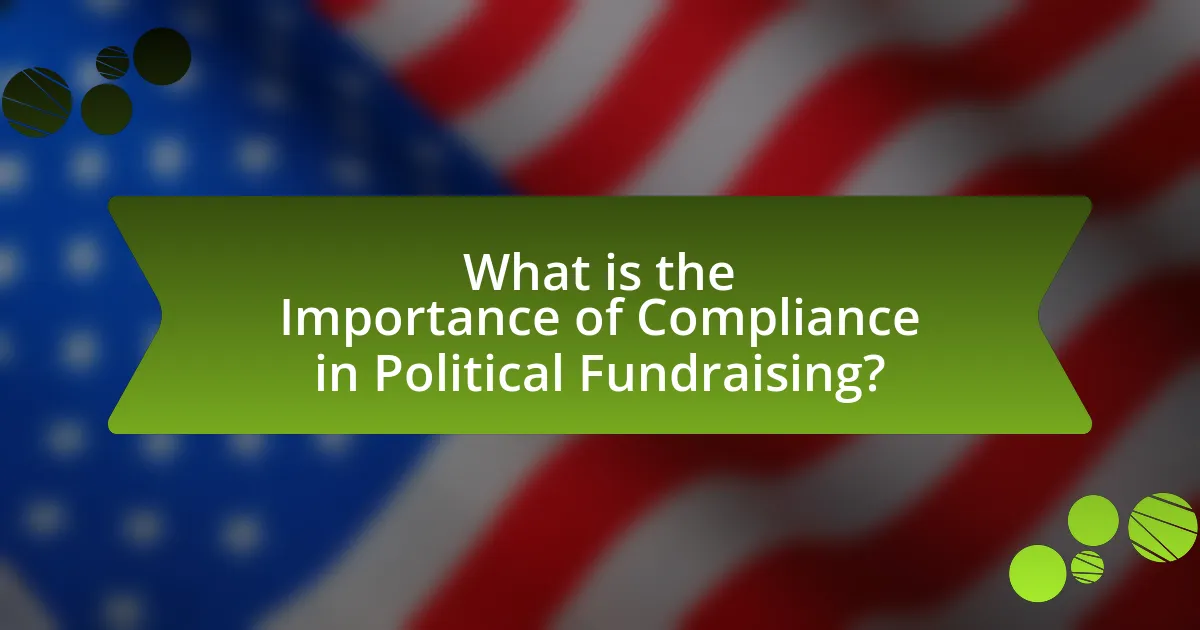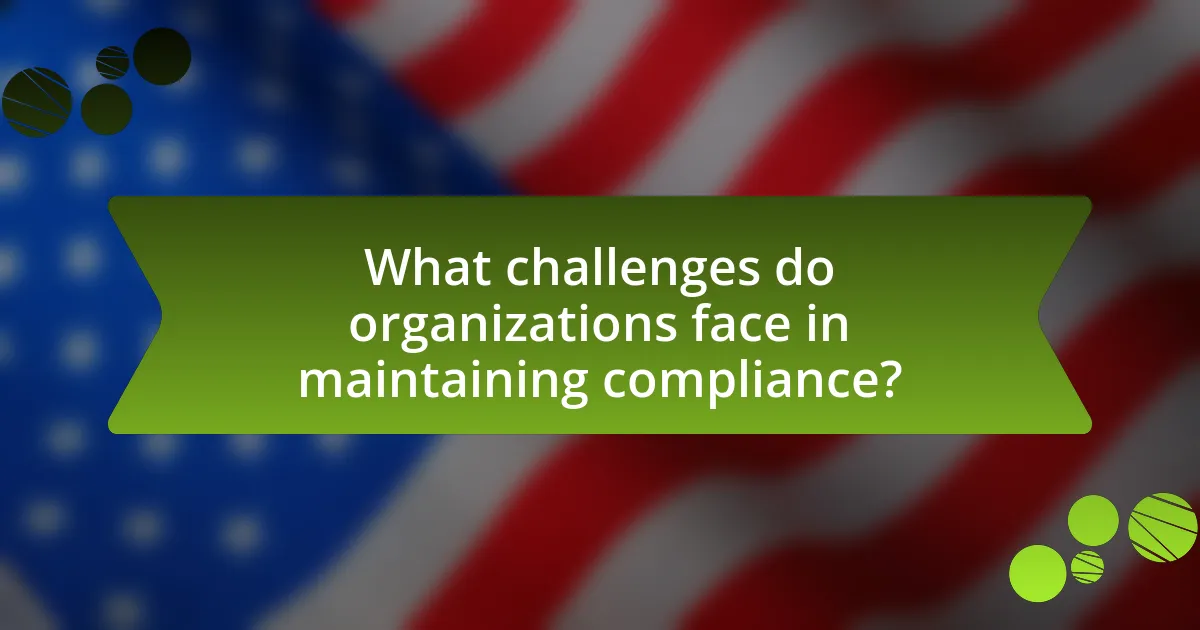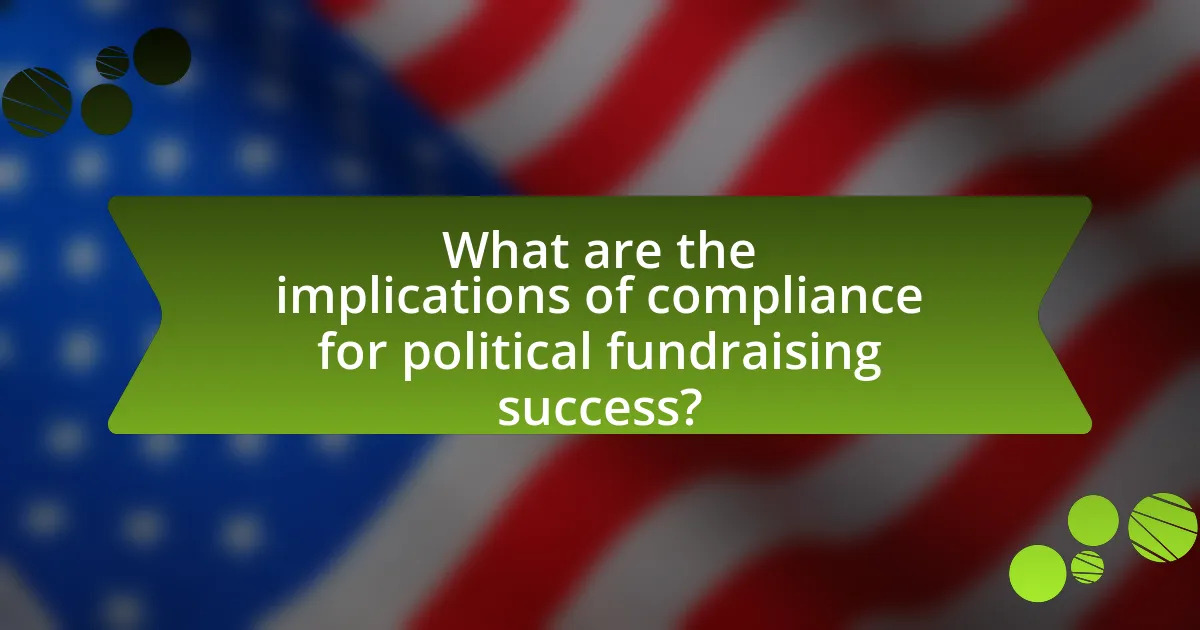The article focuses on the critical role of compliance in political fundraising, emphasizing its necessity for adhering to legal regulations and maintaining transparency. It outlines the potential consequences of non-compliance, including legal penalties and loss of public trust, while highlighting key regulations such as those enforced by the Federal Election Commission. The discussion also covers best practices for ensuring compliance, the impact of compliance on donor relationships, and the importance of staff training in navigating the complex legal landscape. Additionally, it addresses the challenges organizations face in maintaining compliance and the implications for long-term fundraising success.

What is the Importance of Compliance in Political Fundraising?
Compliance in political fundraising is crucial to ensure adherence to legal regulations and maintain transparency. It protects candidates and organizations from legal penalties, as violations can lead to fines or disqualification from elections. For instance, the Federal Election Commission (FEC) mandates strict reporting requirements for contributions and expenditures, which, if not followed, can result in significant legal repercussions. Furthermore, compliance fosters public trust, as transparent fundraising practices demonstrate accountability and integrity, essential for a healthy democratic process.
Why is compliance crucial in political fundraising?
Compliance is crucial in political fundraising because it ensures adherence to legal regulations governing campaign contributions and expenditures. Violating these laws can lead to severe penalties, including fines and criminal charges, which can jeopardize a candidate’s campaign and reputation. For instance, the Federal Election Commission (FEC) enforces rules that limit contributions from individuals and organizations, requiring transparency in financial reporting. Non-compliance can result in investigations and loss of public trust, ultimately affecting electoral outcomes.
What are the potential consequences of non-compliance?
The potential consequences of non-compliance in political fundraising include legal penalties, loss of reputation, and financial repercussions. Legal penalties can manifest as fines or sanctions imposed by regulatory bodies, which can reach thousands or even millions of dollars depending on the severity of the violation. Loss of reputation occurs when organizations or individuals are publicly associated with non-compliance, leading to diminished trust from donors and the public. Financial repercussions may involve the return of funds raised improperly, which can destabilize campaign finances. According to the Federal Election Commission, violations of campaign finance laws can result in civil penalties that significantly impact a campaign’s viability.
How does compliance impact public trust in political campaigns?
Compliance significantly enhances public trust in political campaigns by ensuring transparency and accountability. When campaigns adhere to legal regulations regarding fundraising and spending, they demonstrate integrity, which fosters voter confidence. For instance, a study by the Pew Research Center found that 70% of voters believe that compliance with campaign finance laws is crucial for maintaining trust in the electoral process. This adherence not only mitigates the risk of scandals but also reassures the public that candidates are committed to ethical practices, thereby strengthening democratic engagement.
What are the key regulations governing political fundraising?
The key regulations governing political fundraising include the Federal Election Commission (FEC) rules, which set limits on contributions to candidates and political parties, and the requirement for transparency in reporting contributions and expenditures. The FEC mandates that individuals can contribute a maximum of $2,900 per election to a candidate, while political action committees (PACs) have different limits. Additionally, the Bipartisan Campaign Reform Act (BCRA) restricts the use of soft money in federal elections, ensuring that all contributions are disclosed. These regulations are enforced to maintain the integrity of the electoral process and prevent corruption.
What federal laws must political fundraisers adhere to?
Political fundraisers must adhere to federal laws such as the Federal Election Campaign Act (FECA), which regulates campaign contributions and expenditures. FECA mandates that political committees register with the Federal Election Commission (FEC) and file regular financial reports detailing contributions and spending. Additionally, the law prohibits contributions from foreign entities and imposes limits on individual contributions to candidates and political parties. Violations of these regulations can result in significant penalties, including fines and legal action, underscoring the importance of compliance in political fundraising.
How do state regulations vary in political fundraising compliance?
State regulations in political fundraising compliance vary significantly across the United States, with each state establishing its own rules regarding contribution limits, disclosure requirements, and reporting timelines. For instance, some states impose strict limits on individual contributions to candidates, while others allow larger donations or have no limits at all. Additionally, states like California require detailed reporting of contributions and expenditures, whereas states such as Texas have less stringent disclosure requirements. This variation is influenced by factors such as political culture, historical context, and the presence of local campaign finance laws, which can lead to discrepancies in how fundraising activities are monitored and enforced.
How can organizations ensure compliance in their fundraising efforts?
Organizations can ensure compliance in their fundraising efforts by implementing robust internal controls and adhering to legal regulations. Establishing clear policies that align with federal and state laws, such as the Federal Election Commission guidelines, is essential. Regular training for staff on compliance requirements and conducting audits to monitor adherence to these policies further strengthens compliance. Additionally, organizations should maintain transparent records of all fundraising activities, including donor information and financial transactions, to facilitate accountability and compliance verification.
What best practices should be implemented for compliance?
To ensure compliance in political fundraising, organizations should implement best practices such as establishing clear policies and procedures, conducting regular training for staff, and maintaining accurate financial records. Clear policies help define acceptable practices and legal obligations, while regular training ensures that all personnel are aware of current laws and regulations, which can change frequently. Accurate financial records are essential for transparency and accountability, as they provide a clear audit trail that can be reviewed by regulatory bodies. According to the Federal Election Commission, organizations that adhere to these practices are less likely to face legal issues and penalties, reinforcing the importance of compliance in maintaining the integrity of political fundraising efforts.
How can technology aid in maintaining compliance?
Technology aids in maintaining compliance by automating data collection and reporting processes, ensuring adherence to legal requirements in political fundraising. For instance, compliance management software can track contributions, monitor spending limits, and generate reports that align with regulatory standards. According to a study by the National Association of Secretaries of State, 70% of states utilize technology to enhance transparency and compliance in campaign finance, demonstrating its effectiveness in reducing human error and increasing accountability.

What challenges do organizations face in maintaining compliance?
Organizations face several challenges in maintaining compliance, particularly in the context of political fundraising. These challenges include navigating complex regulations, which can vary significantly by jurisdiction and change frequently, making it difficult for organizations to stay updated. Additionally, organizations often struggle with the lack of clear guidance on compliance requirements, leading to potential misinterpretations of the law.
Moreover, the financial burden of compliance can be substantial, as organizations may need to invest in legal counsel, training, and compliance systems to ensure adherence to regulations. A study by the Association of Certified Fraud Examiners found that organizations spend an average of 5% of their revenue on compliance-related activities, highlighting the financial implications of maintaining compliance.
Lastly, organizations may face internal resistance to compliance efforts, as employees might prioritize operational goals over regulatory adherence, which can lead to lapses in compliance. These factors collectively create a challenging environment for organizations striving to maintain compliance in political fundraising.
What common pitfalls lead to compliance issues in political fundraising?
Common pitfalls that lead to compliance issues in political fundraising include inadequate record-keeping, failure to adhere to contribution limits, and lack of transparency in donor disclosures. Inadequate record-keeping can result in missing or inaccurate financial reports, which are essential for compliance with federal and state regulations. Failure to adhere to contribution limits can lead to legal penalties, as candidates and committees must strictly follow the maximum amounts set by law. Additionally, lack of transparency in donor disclosures can raise suspicions of illegal contributions or money laundering, as seen in various high-profile cases where undisclosed donors faced scrutiny. These pitfalls highlight the critical need for political fundraising entities to implement robust compliance measures to avoid legal repercussions.
How can organizations identify and mitigate these risks?
Organizations can identify and mitigate risks in political fundraising by implementing comprehensive compliance programs and conducting regular audits. These programs should include training for staff on legal requirements and ethical standards, ensuring that all fundraising activities adhere to federal and state regulations. Regular audits help organizations assess their compliance status and identify potential vulnerabilities, allowing for timely corrective actions. For instance, the Federal Election Commission (FEC) provides guidelines that organizations can use to align their practices with legal standards, thereby reducing the risk of violations and associated penalties.
What role does staff training play in ensuring compliance?
Staff training plays a critical role in ensuring compliance by equipping employees with the knowledge and skills necessary to understand and adhere to legal and regulatory requirements. Effective training programs help staff recognize compliance risks and the importance of ethical behavior in political fundraising, which is governed by complex laws. For instance, organizations that implement comprehensive training can reduce the likelihood of violations; a study by the Association of Certified Fraud Examiners found that organizations with effective training programs experience 50% fewer compliance violations. This demonstrates that well-trained staff are better prepared to navigate the legal landscape, ultimately fostering a culture of compliance within the organization.
How do changes in legislation affect compliance requirements?
Changes in legislation directly alter compliance requirements by introducing new rules or modifying existing ones that organizations must follow. For instance, when the Federal Election Commission updates regulations regarding campaign finance, political entities must adjust their reporting practices and financial disclosures to remain compliant. Historical examples include the Bipartisan Campaign Reform Act of 2002, which imposed stricter limits on contributions and required enhanced transparency in reporting, thereby increasing the compliance burden on political fundraising organizations.
What recent legislative changes should organizations be aware of?
Organizations should be aware of the recent legislative changes regarding campaign finance laws, particularly the updates to contribution limits and disclosure requirements. For instance, the Federal Election Commission has increased the contribution limits for individuals and political action committees, which now allows individuals to contribute up to $3,300 per election to a candidate. Additionally, new regulations mandate more stringent reporting of campaign expenditures and contributions, requiring organizations to disclose their donors more transparently. These changes aim to enhance accountability and transparency in political fundraising, reflecting a growing emphasis on compliance within the legal landscape of political contributions.
How can organizations stay updated on compliance-related changes?
Organizations can stay updated on compliance-related changes by subscribing to regulatory updates from relevant authorities and industry associations. These subscriptions provide timely information on new laws, regulations, and amendments that impact compliance requirements. Additionally, organizations can participate in webinars and training sessions offered by compliance experts, which often cover recent changes and best practices. Engaging with legal counsel who specializes in compliance can also ensure that organizations receive tailored advice and updates specific to their operations. Regularly reviewing compliance-related publications and resources, such as newsletters from law firms or compliance organizations, further supports staying informed about the evolving legal landscape.

What are the implications of compliance for political fundraising success?
Compliance significantly impacts political fundraising success by ensuring adherence to legal regulations, which fosters trust among donors and enhances campaign credibility. When political entities comply with laws such as the Federal Election Commission regulations, they mitigate the risk of legal penalties and reputational damage. For instance, campaigns that accurately report contributions and expenditures are more likely to attract larger donations, as transparency reassures potential supporters about the integrity of the fundraising process. Studies have shown that campaigns with strong compliance records can raise up to 30% more in contributions compared to those with compliance issues, highlighting the direct correlation between compliance and fundraising effectiveness.
How does compliance influence donor relationships?
Compliance significantly influences donor relationships by establishing trust and transparency between organizations and their contributors. When organizations adhere to legal and ethical standards, they demonstrate accountability, which fosters confidence among donors. For instance, compliance with regulations such as the Federal Election Commission guidelines ensures that funds are raised and spent appropriately, thereby reassuring donors that their contributions are being used effectively. This trust can lead to increased donor loyalty and willingness to contribute in the future, as evidenced by studies showing that organizations with strong compliance records often experience higher donor retention rates.
What strategies can enhance donor confidence through compliance?
Implementing transparent reporting practices enhances donor confidence through compliance. By providing detailed financial disclosures and regular updates on fund allocation, organizations demonstrate accountability, which fosters trust among donors. Research indicates that 78% of donors are more likely to contribute when they see clear evidence of compliance with legal and ethical standards. Additionally, establishing a robust internal compliance program, including regular audits and staff training on legal requirements, further reassures donors that their contributions are managed responsibly. This proactive approach not only mitigates risks but also aligns with best practices in political fundraising, ultimately strengthening donor relationships.
How can compliance contribute to long-term fundraising success?
Compliance contributes to long-term fundraising success by ensuring adherence to legal regulations, which builds trust and credibility with donors. When organizations follow established laws and guidelines, they minimize the risk of legal penalties and reputational damage, fostering a stable environment for fundraising activities. For instance, a study by the National Association of Secretaries of State found that compliance with campaign finance laws enhances transparency, which is crucial for donor confidence. This trust leads to increased donor retention and higher contributions over time, ultimately supporting sustained fundraising efforts.
What practical steps can organizations take to improve compliance?
Organizations can improve compliance by implementing comprehensive training programs for employees on legal requirements and ethical standards. These programs should be regularly updated to reflect changes in laws and regulations, ensuring that all staff members are informed and aware of their responsibilities. Additionally, organizations should establish clear policies and procedures for compliance, including regular audits and assessments to identify potential risks and areas for improvement. Utilizing technology, such as compliance management software, can streamline monitoring and reporting processes, making it easier to adhere to legal standards. Furthermore, fostering a culture of transparency and accountability encourages employees to report non-compliance issues without fear of retaliation, thereby enhancing overall compliance efforts.
What resources are available for organizations seeking compliance guidance?
Organizations seeking compliance guidance can access a variety of resources, including government websites, legal firms specializing in compliance, and industry associations. Government websites, such as the Federal Election Commission (FEC) and the Internal Revenue Service (IRS), provide official regulations and guidelines for political fundraising compliance. Legal firms often publish white papers and offer consultations to help organizations understand complex compliance issues. Additionally, industry associations, like the National Association of Secretaries of State (NASS), offer training and resources tailored to compliance in political fundraising. These resources are essential for navigating the legal landscape effectively.
How can organizations develop a culture of compliance within their teams?
Organizations can develop a culture of compliance within their teams by implementing comprehensive training programs that emphasize the importance of legal and ethical standards. These training programs should be tailored to the specific regulatory requirements of political fundraising, ensuring that all team members understand their responsibilities and the potential consequences of non-compliance. Research indicates that organizations with robust compliance training see a significant reduction in violations; for instance, a study by the Ethics & Compliance Initiative found that effective training can lead to a 50% decrease in misconduct. Additionally, fostering open communication channels encourages employees to report concerns without fear of retaliation, further reinforcing a culture of compliance.



